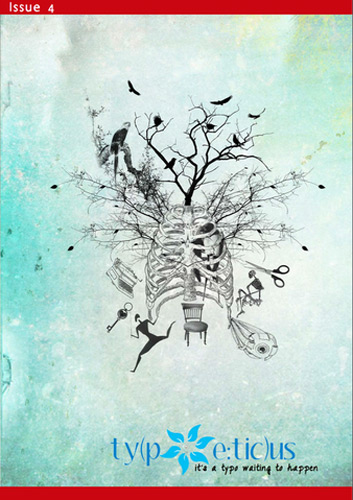Typoetic.us – 2015
Typoetic.us is a play on words, on the url and its own name (Typoeticus: ending like so many Greek names with the -ticus), and just a downright playful poetry journal. But don’t take playful to mean light and frivolous; rather, playful in the way that us literarians appreciate. The featured writers skillfully play with language, sound, emotion, and experience, and as readers, we are invited along as playmates. With the variety of styles the editorial sense includes, no one is left out.
Typoetic.us is a play on words, on the url and its own name (Typoeticus: ending like so many Greek names with the -ticus), and just a downright playful poetry journal. But don’t take playful to mean light and frivolous; rather, playful in the way that us literarians appreciate. The featured writers skillfully play with language, sound, emotion, and experience, and as readers, we are invited along as playmates. With the variety of styles the editorial sense includes, no one is left out.
I was intrigued by Caits Meissner’s “Zuihitzu for Becoming” since I had not encountered this zuihitzu form before. For others uninitiated, it is a Japanese genre in which various ‘fragments’ of writing—be it lists, poems, essay snippets—are brought together to create a kind of collage which offers some insight into the author’s life and surroundings. Meissner’s zuihitzu blends essay, poetry, dated journal entries (poems, narratives, and lists), post-it notes, and excerpts combined from Wikihow. Meissner creates a collage of a woman’s growth from childhood to marriage, examining the cultural context of womanhood to working with juvenile detainees. It’s difficult to snag snippets from all these pieces to exemplify the whole, which is clearly why zuihitzu is such a beautiful form, and proof that Meissener succeeds at it. There is no ‘whole’ to see, but instead to feel and sense once it has all been read. Editors selected two other works by Meissener in this issue which display her range of style as a poet.
Jessica Wiseman Lawrence stole my love in this issue. With four poems throughout, she seemed to have wowed the editors as well. Each features lines which capture characters or settings in specific details that reflect something so much larger. From “His Girl”: “Waves of hair teased her small face. / Her freckles were lost in the sea of it.” From “Figure Ground”: “She rocks her baby, and sings. The child’s black hair is so smooth it reflects the green and purple, and his skin is smooth with possibility.” And from “Administrative”: “Office work is a flip of pages, / a stapling thud.” I simply couldn’t excerpt “Could This Ever Be New Again?”; it needs to be read in full. More from Lawrence—someone, please!
I was afraid “Millenialism” by Joshua Robinson might slip into the clichés attacking this generation, but it surprised me by offering both humor and pithy analysis. Certainly, it can be read lightly with a number of lines that got me to smile, but because I want more smarts, I can also say Robinson delivers, mingling wit with social commentary and criticism:
We are abandoned by a world that told us to follow our dreams.
We are mostly American, and most of us are uneasy about it.
Some of us have left permanently. We would like to know if youwant fries with that. We want to know where the hell that layer
went in Photoshop. We want to know if you are
allergic to penicillin. We would like to know whywe have to proofread this bill, when our congressmen,
congressperson won’t read it. We would like to change
the world but we can’t run for president. Fuck that shit.
Twenty-four triplets to the poem make a well-paced, tightly designed portrayal that indeed does not fall into cliché, but rather propels the reader forward on the tethered message of this generation.
Jessica Lindsley offers two pieces that couldn’t be more different. “Dedicated to Predators: Samurai Aphids and Flowerflies of Japan” appears in six short numbered segments. First the Samurai Aphid (“Wraps massive forelegs around each white egg in the cluster . . . ”), then the flowerfly (“Allowed to emerge / From drowsy and dreamless Incubation . . . ”), then the aphid (“ . . . a dauntless soldier . . . a single-minded killing force . . .”), then the flowerfly (“ . . . drinking / The sweet sap / Of the thorax . . . ”). Lindsley’s form as well as words creates a perfectly portrayed tension between the two, asking the question in the final stanza: “Which comes first. / The egg or the prey?” Lindsley’s other poem, “Patience of the Meteor,” is a two-stanza prose piece which begins, “Under cover of darkness, we rode neon plastic sleds down the floodwall into the trees beside the river. Landing in the drifts before the cattails. The night we lost her . . . ” Lindsley captures drama so well, from the smallest existence of an aphid to humans thrown into the cosmos; an expansive poetic reach.
“The idea of typoetic.us,” write the editors, “is messy, unintentional, and as beautiful as a flower.” In French: belle mélange—a beautiful mess or a beautiful mingling. Typoetic.us is precisely that, both as a publication and in the works it seeks. These are not “easy” poems to reads, but deeply satisfying for readers who enjoy the challenge of exploring the possible connections authors create, both within the poem and to the world of experience around us.
[www.typoetic.us]






